I’m so glad you joined us because we have Bill Ferguson and Dick Traum here. You’ve probably seen Bill featured on Oprah. He’s a relationship expert. He’s a consultant. He is a seminar leader at Mastery of Life. He has a new book. Dick Traum is the President and CEO at Achilles International. He co-wrote a book with the CEO of Cigna. We’re going to talk to both of them about their new books.
Listen to the podcast here
Finding Healing with Bill Ferguson
I am here with Bill Ferguson. His approach to life has been called the penicillin of psychology. As a former divorce attorney, 15% of his clients never divorced and the ones who did were able to part as friends. He’s been called the Love Counselor. His work has been featured on Oprah. He’s been recommended by the Wall Street Journal. He’s got some very successful national bestsellers and his newest book is called Get Your Power Back. I’m excited to talk to you. Welcome, Bill.
I’ve been looking forward to this.
We’re going to talk about his latest book and finding a way to heal issues that sabotages our lives. I want to know a little background. I said you were a former divorce attorney. Can you give a little background what led to you writing books and speaking and doing the things you do now?
I started out as a divorce attorney and I decided early on I had to either be an adversary or a peacemaker. My focus was on having my clients heal their relationship with each other, one human being to another because it made the legal work so much easier. I became really good at it. 15% of my clients never divorced and the ones that did were able to part as friends. In the process, I learned a lot about what creates love and what destroys love. Back in ’85, I closed my law practice and put all my focus on showing people how to create that experience of love in their lives and have all of their lives work. At first, it was looking about how do you create that experience of love and relationships? Then I started seeing it’s about how do you create that experience of love in life? I started discovering what it is that messes everything up and it’s been this evolution that I’ve been going down for almost 35-plus years. In the process, I’ve learned a lot about what has life work and what doesn’t have life work.
Were you in Arizona with your law practice? Where was your practice?
In Houston.
I’m thinking of a lot of lawyers make a lot of money off those depositions that make people upset with one another. Was that good for your practice to remove all that conflict? I’m sure that’s a very selfless act.
I definitely would have made more money if there was more conflict, but my heart wasn’t in it.
I have to give you credit for that because a lot of people take advantage of that. Your work is very important for the workplace because it ties into some of the stuff that I talk about with my work in curiosity in terms of the things that hold people back. What I found in my research and what keeps people from being curious is their environment and environment can include your family, your co-workers and your teachers. A lot of things that people do in relationships are destructive and they don’t even intend it. You might direct somebody in a certain way and that’s why I was interested in your book. Did you find something similar in your experience?
In working with people, it’s interesting how each person has different areas of life that don’t work, but with each person, the same area consistently doesn’t work. The area that doesn’t work for one person is going to be totally different from the area that doesn’t work for the other person. I noticed this commonality in all of them. There’s the reality and then there’s our reality. In the reality, things just are. What happened is what happened and what is this? That’s the reality. Our reality consists of all of our thoughts, feelings, emotion, points of view, opinions, our stuff. There’s the truth and there’s our stuff about it. It’s our stuff that shapes our actions and determines what happens in our life.
[bctt tweet=”What doesn’t work for one person is going to be totally different from what doesn’t work for the other person.” via=”no”]How do we recognize that?
Here’s the thing, why this is important is because when you’re at peace with the truths, you can see the truth. You can see what you need to do. You’re very effective. To say that another way, the areas of life that work great are areas where you can flow with whatever happens. The areas of life that don’t work are areas where we can’t flow. This is in relationships. This is any area of life. Literally, any time there’s a relationship or an area of life that isn’t working, why it’s not working is that we’re instead of putting the focus on what do I need to do based on the facts. The focus is on finding the facts.
How can that help teams in the workplace because everybody is so unique? You see things from your own perspective. What we think are facts. How do we tell ourselves they’re not facts if they’re not? How do we get to that point?
It’s a matter of being able to flow with whatever happens. You still do whatever you need to do. It’s so important that your decisions and your actions are based on facts instead of emotion. For example, when we’re upset or when we get threatened or when we’re in a state of fear, it’s not about facts. It’s all about emotion.
It ties down to emotional intelligence, which is what I studied. It’s about empathy, right?
Yes, it’s more than that. It’s about that inner state of case. When you’re present with who you are, you are happy that you’re alive, you’re free. You feel good about yourself. You feel good about life. You’re on top of life. The circumstances have no power. You also have a very positive attitude. You radiate that positive energy and great things happen around you. That’s the natural state right. That’s what is there when you get rid of all the junk.
That’s hard to do, right?
Yes, because we don’t even put focus on the junk.
How do we do that?
Why we can’t flow with life? Why we can’t be at peace with the truth is because the truth hurts. It strikes a nerve. That’s why different people get upset at different things. Each person has a different set of nerves. They get triggered.

Micro Communities: The areas of life that work great are areas where you can flow with whatever happens.
How do you deal with that?
You will find what the nerve is, but you want to see how it all works. You want to find what the nerve is it being triggered and you want to heal it. The hurt that runs our life is never based on fact.
It’s based on our perception, right?
Yes, the things that happen in our lives are facts. What we get with that is something we created. When we’re born, we’re born pure love but we’re born into a world that kills love. In the process of growing up, every single one of us gets hurt. Every single one of us collides with our culture. We experience these very painful losses of love. As a little child, the only way we can explain these incredibly painful losses of love is to blame ourselves. Clearly, I’m the problem. We decide what that problem is, “I’m not good enough. I’m not worth loving. I’m worthless. I’m a failure. I’m this. I’m that.” It’s never the truth. In the eyes of a little child in that moment of deep hurt, it becomes our truth. We fight the very belief we created, which then magnifies it out of proportion. Our whole life has been about running from that hurt. If any circumstance comes along and triggers that hurt, that circumstance will be perceived as a threat to our survival because if I am worthless, I might as well die. We’re forced to either attack the perceived threat or run from it. The battery of life didn’t work.
I see a lot of people who blame others. Are they blaming themselves? Are they blaming others?
Some people can’t take responsibility for anything. Why they are constantly blaming is because it’s a defense mechanism. I point over there, so I don’t have to look at myself. If I were to look at myself, I’d have to see that I’m the problem namely I’m not good enough, worthless, failure or whatever, which again is never the truth. It’s just a hurt, but it’s a hurt that we’ll do anything to avoid feeling. In an automatic attempt to avoid the hurt, we blame.
How do we let go of that?
First thing is you’ve got to find what it is.
How do you do that?
Your upset will reveal the hurt. One thing to notice is that no circumstance has the ability to create an upset. That upset is a state of mind and can only exist if you’re fighting the truth of what happened.
[bctt tweet=”When you’re at peace with the crew, you can see the truth. ” via=”no”]You’re saying that we’re upset because the truth bothers us, so we try to see it something other than that?
Some circumstances rose along and triggers our hurt. We don’t notice that we have a hurt that’s being triggered, all we notice is the circumstance that triggers it. The circumstance is perceived as a threat, we fight the threat, which then creates a state of upset. If you look at any time you’ve ever been upset, notice what would happen to the upset if somehow by some miracle you were at peace with the truth of what happened. The upset would disappear in an instant.
Are there some truths of what happened that you can’t get over? You shouldn’t get over or we should get over everything?
There’s no should but the more you’re free of everything, the more you’re at peace, the more effective your life.
A lot of people I know had a lot of things happen to them in their childhood that built up all the way. How far back can you figure out where the hurt started?
You’re not likely to ever know where it started. You don’t need to know where it started. All you’ve got to do is discover what it is. Your upset of now will show you what it is.
Do you think it’s easier to see what upsets other people more than it is to see what upsets ourselves? Is it easier to have the ability to get outside and look at other situations?
It’s pretty easy to see it in yourself. Let’s look at what the nerve is. The nerve is always going to be the suppressed hurt, the suppressed emotion of feeling in some way not okay. Not good enough, not worth loving, worthless, failure, don’t count, don’t matter or something like that. In looking for the hurt, you want to keep in mind that you’re not looking for the truth. The hurt doesn’t exist in the realm of truth. Worthy and worthless do not exist in reality, they only exist as judgments in our mind. You can search the whole world over for good enough and you’ll never find one. If you did, what color would it be and how much would it weigh? We literally spend our lives running from something that doesn’t even exist.
It is interesting to see the motivations behind everybody’s behaviors. You’ve been focused on behaviors in all of your work. I’m curious how you got noticed with your first work and even featured on Oprah or recommended by the Wall Street Journal. What do you think it is about when you’re studying that resonates so much that you get picked up by such big names?
The thing I found is there’s a truth in every one of us, but we don’t look there. When we hear it, you can’t argue with it because it resonates. It’s like you know that is so. There are these certain things once people discover them, it literally changes the way they live their life.

Micro Communities: The more you’re free of everything, the more you’re at peace and effective at life.
What’s the step-by-step thing they do once they discover what it is?
The first thing you do is you want to find what the hurt is and in looking for the hurt, you’re not looking for the truth. You’re looking for the emotion. Don’t look and see is it true that you’re worthless or whatever because it’s not true. Don’t look to see is it true instead look to see if it were true, would it be painful?
What if it is?
The more painful it is, the more suppressed hurt there is, the more it runs your life.
What do you do?
First, you’ve got to find it and there are a number of places to look. The best place to look is the hurt that you experienced as a child. Go back in that hurt. Put yourself in that hurt and ask yourself, if your own parents treat you that way, these horrible things happen to you, according to the hurt, what would that say about you? Another place to look at your upsets. Make a list of all your major upsets. With each upset, look at the hurt that’s underneath it and say, “What are those circumstances say about me?” Do that with all your upsets. Do it with your fears. If your fear came true, what would you have to feel? What would that say about you? What are you driven towards? What do you need for your happiness? If you were never to get it? If you would never get it, what would that say about you? You look at these things and you start seeing that there’s a theme that runs through all of it. That’s what you need to heal.
I deal with this in my writing about curiosity. Let’s say somebody has a fear of asking questions in a meeting because they’ll look stupid if they do. It upsets them to say anything, so they don’t say anything and they resent that.
That person will have a major hurt associated with stupid. A lot of people have issues with rejection or abandonment. The hurt that’s underneath that is almost always the hurt of not worth loving. You ever know people who were consistently late. People who were consistently late are people who had major issues with being controlled. The hurt behind the fear of control almost always is worthless. They don’t count. They don’t matter.
Back to the fear of stupid, how do you deal with that? Now that you know that, you don’t want to feel stupid. You’ve recognized it. You found the problem. What do you do?
You’ve got to do the opposite of what gives that power. What gives it power is fighting it. Whatever you resist no matter what it is, the resisting is going to magnify and give power to whatever you resist. As an example, imagine on the ceiling above you, four large yellow balloons. Whatever you do, don’t think about them. You get yellow balloons everywhere. Ultimately, there’s no difference between yellow balloons and worthless or failure because they’re just thought. We fight the thought. In our fighting it, we fight the thought and we fight the emotion associated with it, which then magnifies it out of proportion and turns it into a monster. The more we fight it, the more we create it. The bigger it gets in our mind, the more it shows up in our lives.
[bctt tweet=”It’s so important that your decisions and your actions are based on facts instead of emotion.” via=”no”]Is it a little bit like, “What about Bob?” and you’ve got to do baby steps and face it slowly?
No, I would say face it fast.
No baby steps.
To heal the hurt of failure or not worth loving or stupid or whatever it is, you’ve got to do the opposite of what gives it power. What gives it power is fighting it. What will have it lose power is to own it and embrace it.
A lot of people are terrified of facing something like that. How do you get over that to face it so fast?
What I do is before I have people face it, I have them see the illusion of it.
How do you do that?
We’ll have them see it for what it is. There are some steps that I go through that I have them see that it would be physically impossible for somebody to be worthy or worthless. I’ll give you an example. If you had the Hope Diamond, which is worth millions and millions of dollars and you put it right beside a glass of water, which would be more valuable?
They’re going to say the diamond.
What if you’re dying of thirst in the desert? It’s all relative. You cannot find a worthy or a worthless because they are just judgments. They only exist in our mind. They exist as two sides of the same coin. One moment you’re on the worthy side. The next moment you’re on the worthless side.

Micro Communities: Resisting is going to magnify and give power to whatever you resist.
You trained therapists, lead seminars and work with people around the world. How long does it take to change this lifelong way of thinking though?
Typically, I could work with somebody in a couple of hours and have them get on top of the issue. It’s an issue that you’re going to be working with for a while, but you can heal a major hunk of it very fast. What’s more important than that is that you can get on top of it very fast.
Do you go to organizations and help teams with this or is this an individual thing that you deal with?
Mostly individual. I have the book, Get Your Power Back. It shows how it all works and it walks people through the healing process. I do workshops where I walk people through it. I also do the individual work.
What’s the biggest thing you see people are afraid of?
The biggest issue most common one is probably not worth loving and then not good enough, and failure. Worthless is another big one. Those are the main ones.
Where do they usually get these thoughts? Is it because of their childhood usually or their family?
Most people get it from their parents but not everybody. If you don’t get it from your parents, you’re going to get it from school. Everybody gets it.
How do you get it from school, the teachers?
The teachers, the kids. We are born into a world that’s judgmental and critical. If things happen, we can’t help to become judgmental and critical of ourselves. We create the belief that we’re not okay and then we fight it. We fight to believe and then we also fight the emotion associated with it.
[bctt tweet=”When you’re present with who you are, you are happy, alive, and free.” via=”no”]Is it even more prevalent in the sales world do you think because it’s so competitive that we’re more judgmental of salespeople or of ourselves if we’re salespeople?
The fear of failure can mess somebody up because the fear of failure will prevent somebody from taking a chance or the fear of rejection will hold a person back.
This type of thinking would help somebody in sales. It wouldn’t take away their competitive edge, right?
Absolutely. It would probably give them more of a competitive edge because instead of being motivated by fear, they become more motivated by their passion.
I see a lot of uses for this and I’m excited to talk to you about this because you know you’ve done some amazing things. I love the penicillin of psychology and the fact that you’ve gotten such exposure with your work in the past. Get Your Power Back has a lot of things to offer for a lot of things that I’m interested in as far as stopping fear and impact of environment and some of the things that we’ve been talking about. A lot of people would probably like to know how they can get your book or take your seminars or work with you in general. If you wouldn’t mind sharing some links or information?
You can go to the website, MasteryOfLife.com. It talks about the issues. It talks about the individual work that I do with people, the seminars that I have. There’s a section there called Articles & More that has a bunch of videos and articles on how we create our lives and how to have your lives be great. You can get the book you know any place you get books.
It has so much great information in it. It was so nice of you to share that. Bill, I enjoyed our conversation. I hope everybody checks out your book. Thank you for being on the show.
It’s wonderful being with you. It’s been a real joy. Thank you so much for inviting me.
You’re welcome.
Inspiring Micro Communities with Dick Traum
I am here with Dick Traum who was the first runner to complete a marathon with a prosthetic leg when he crossed the finish line at the 1976 New York City Marathon. In 1983, he founded Achilles International whose mission is to enable people with all types of disabilities to participate in mainstream running events. He co-authored a book with the President and CEO of Cigna, David Cordani, titled The Courage to Go Forward, The Power of Micro Communities. It’s so nice to have you here, Dick.

Micro Communities: Fighting the emotion turns the monster within into a monster.
It’s a pleasure to be here.
This is going to be interesting. Your book is inspirational. Thank you so much again for sending me a copy. I was fascinated in so many things that you do. It’s interesting that you wrote the book with David. I used to be a pharmaceutical rep forever. You have a lot of things in your book and in your background. You have this background of being a Founder and President of Personnelmetrics. You’ve got a PhD from New York University. You’ve got a lot of interesting background behind this whole story. I want to make sure we get everybody up to speed on what went into all of this that you do. Can you maybe start with your background and how you lost your leg? What led to your interest in creating this foundation?
This goes back into 1965. I was on the New Jersey Turnpike. I stopped for gasoline. When I was behind my car, another car hit me into my car and eventually I lost my leg. I returned to school. I started work. I founded a company called Personnelmetrics. This was a company that focused on quantitative analysis and human resources. The idea was how can people be more effective? While you’re running your company, you speak. One of my places was the American Management Association and someone passed through a heart attack, one of the program directors and someone else suggested I take up a fitness program because I was walking with a limp and I was overweight. That’s how I became involved in running.
You went from running to a lot more than running.
The trick was that I had developed friendships with people at the YMCA. They were all runners. This is probably the most potent factor in motivation and this is the micro-communities that we talked about on the book. The issue is how do you do something that’s virtually impossible? It’s a small group. It’s a two-person group. It’s a larger group. This is where David Cordani, for example, has run many marathons with people who have two artificial legs. They’re running on two artificial legs with David. The question is how is that possible? Virtually it’s impossible except that there’s a concept of the micro-communities.
Can you explain what a micro-community is?
A micro-community is a situation where you have two or more people that bond. You’re out there and what happens is you are running faster than that person. You have someone to talk to. You have someone to brag to. There is this interaction that motivates.
You need to have two or more. How big can it be though?
It can be two. It can be five. It can be 50. It’s a group of people where you are in fact trying subconsciously to increase your status. Think of a pecking society and a hen house. How do you do this? You do it by working harder. You do it in any which way you can, which you want to become a more important person in this micro-community.
I’m thinking of this and you were talking about factors and motivation and the importance of micro-communities. Since I wrote about curiosity, my thought was all about increasing motivation. How can we use micro-communities in the workplace to get people more motivated and driven to follow their natural sense of curiosity?
[bctt tweet=”In the process of growing up, every single one of us gets hurt.” via=”no”]Part of it is giving people an opportunity to achieve. In other words, not over supervising. You give him a little room, but you need to set it up so that the person in the organization does something well and receives the credit for it. It’s not the supervisor competing with the subordinates for credit, but it’s the individuals doing, serving and getting the feeling of great accomplishment.
It’s interesting to look at competition and it’s changing in different generations. Do you think they’re becoming more or less competitive as each generation is going by?
I’m not sure. I never thought about it. I do know that there’s a lot of competition. One of the things that I was involved at Personnelmetrics was the age of a supervisor and subordinate. Interestingly, when they were similar in age, there were greater issues than there were large age differences. The idea is that you don’t have peers that you’re competing with as differentiated situations where there isn’t a competition. The trick is to set it up so that the person in the organization isn’t directly competing with his or her boss.
Your background, Personnelmetrics, had to give you a great foundation for everything else that you’ve done. I know that Achilles is over 110 chapters in 41 countries. Is that still the number or has it changed?
That’s still the number.
How did you get hooked up with David Cordani?
Ten years ago, Cigna invited us to do a race in New England. We sent several people there and friendships developed and it evolved from that.
You lost your leg at the age of 24. This was in 1965?
Yes.
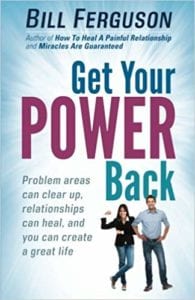
Get Your Power Back: Problem areas can clear up, relationships can heal, and you can create a great life
Then you’ve crossed the finish line in ’76. Why so long to wait to write this book?
I wrote another book in 1993. I assume that nothing more would ever happen, but between 1993 and now the Achilles has probably grown tenfold.
What do you think is the reason for the growth?
People are much more comfortable with the issue of disability. When I started running, people would turn around and look at me and ask if I was The Six Million Dollar Man. I used to tell them I was only a million-and-a-half-dollar man because I lost one leg. When people with disabilities are out there running, it’s not even noticed. It’s a very natural thing.
I had Tanner Gers on my show who lost his eyesight from a car accident. A tree went through his face and blinded him. He ended up being a Paralympic and he would run. I don’t know if he said it on the air, off the air about how they would guide him in his ear. He had something talking to him and to tell him the direction to run. Somebody guided him incorrectly one time and he hit a pole. I’m wondering do you run into issues? My dad was born blind, so I was interested in the blind aspect. Do you get a lot of people with eyesight issues or is it mostly losing limbs or is it all types?
We have many people who are visually impaired. For a person who’s visually impaired, it’s an absolutely fantastic sport because my take on disability is that you lose a lot of your social interaction. When you get out there and you run with someone, it’s like going on a date. You develop friendships. Visually impaired runners develop more friendships through Achilles than they’ve ever had anywhere else. There’s also that issue of the micro-community and there is a bonding. There’s a joy in going faster, cheating and having goals. It’s a fantastic sport. I have run as a guide. When I say run, I use a hand cycle but I run with people who are visually impaired. I used several words. I call those four-letter words like to me, to you, stop, hold, bump. Occasionally people say to the left or to the right, which is a good thing to say because people have to translate this stage right. That’s when someone can run into a tree.
I had Erik Weihenmayer on the show and he’s the first guy on Mount Everest blind and all the other peaks. I believe it was Erik who told me that there was this eye glasses or something that could tell you where you’re going now, and you can call people. He said he was in the mall, he got lost. He could call. It would say turn this way or go that way. Do they have a lot of devices for these people like that?
I am not aware of that. What was interesting for me is that these large majority of people who are blind are not totally blind. Most of our visually impaired athletes can see a double white line on the road. They are there running and they can watch that double white line and interestingly, they can feel it with their feet. In effect they know where they are and where they’re going.
As I said, my dad had 2% vision and he could play golf, you had to find the ball for him. He knew which direction to hit. He was very good. There are certain things. He would ride bikes and do different things that I would never even imagine attempting. It’s amazing what you can do when you have these disabilities. You learn to overcome to some extent and do it in a different way. I was watching you say you work out on the hand bike and I saw you working out in Central Park on a video. I know what you’re talking about with that. I was also listening to how you talk about what you went through when you lost your leg and you seem to have adjusted very well. Was this something that was emotionally devastating to you? That’s a young age, 24, I can’t imagine it wouldn’t be very challenging.
Looking back, it wasn’t. The big thing that I learned, a big surprise when I lost my leg is 24 years old and the life expectancy of someone in those days was 73. I’m thinking and saying, “I’ve already used a third of my life,” which is shocking because at 24 you feel you’re going to live through eternity. My interest was in terms of getting as much out of these next 50 years as I possibly could. Any issues that I had of losing a leg was how much time I was wasting. It took me six months before I was able to go back full time. I’m saying, “I wasted six months of my life and that was 1% said in my life for this problem and that was a big concern.” Another interesting story was that when I was going through this process, I guess the psychologist came in, which is normal. His topic was that you’ve lost your leg, but there was nothing that you can do because of it. I was annoyed and tell the story a little bit off in terms of years but it’s accurate. I said that’s not true. He said, “Name something and I’ll show you how you’re wrong.” I said, “I’ll never beat Frank Shorter in the marathon.” Believe it or not, in 1977, I was running my second marathon and Frank Shorter was running that marathon. He stopped at mile sixteen, so I did beat him in the marathon.
That’s a great story and you have a lot of great stories in your book. I was interested in how you shared other people’s stories. Was that the intent to give a lot of hope showing this story and look at how well things turned out. Can you share some of the things that you had in your book as far as stories?
[bctt tweet=”We literally spend our lives running from something that doesn’t even exist. ” via=”no”]One of my favorites was Zoe Koplowitz. Zoe has MS and she joined us because of her use of crutches and her being slow, she would start four hours early. Here she is in Brooklyn and she’s literally the only marathoner out there. Someone sees her coming by and says, “Are you Grete Waitz?” Zoe was about 200-pounds grabbing my hip weighed 100 and she was so delighted that someone mistook her to Grete Waitz. The following year she put on her t-shirt, “I’m not Grete Waitz.”
How long do they have to finish these races? In a regular marathon, isn’t there a time limit or something?
Many years ago, as in Zoe’s case 24 hours was fine. At this point, the official time is ten hours although a number of athletes take more than ten hours.
I remember running a half marathon. That’s still fast if you have certain issues, isn’t it?
It is. One year, I ran the marathon without my artificial leg. I used the crutches and it took me almost twelve hours. I was very proud to having accomplished it in eleven and a half hours.
That got to be painful under your arms. What is the impact to you of using crutches for that long?
The big issue was carpal tunnel syndrome and that my hands would go numb. A whole big part of this is that my guide would take my hands and stretch out the fingers. Interestingly, the guide was another person who we talked about in the book and her name is Trisha Meili. She is better known as the Central Park Jogger. This goes back in 1989 in New York. She was running at night in the park. She was accosted by and left for dead. She joined Achilles and she started running with us. She did the marathon with me in 1994. She made a funny comment at the end. She says, “This isn’t so hard. I’ll do it myself next year.” She went ahead in 1995. She ran it in four and a half hours, which means that she was faster than the average runner. She was substantially faster than females or first-time runners. That is interesting.
Trisha joined our board and became our first Founding Board Chair. Another thing particularly interesting is that Trisha and a few other people who have traumatic brain injuries and over the years, Trisha and some other folks improved cognitively. There was some feeling that the running may have increased the circulation of blood in the brain. She went to a Dr. Wayne Gordon at Mount Sinai, who was doing a survey or doing research to this. The first article, which included Trisha as one of the co-authors, Concerned Running and Improved Cognitive Abilities. At the marathon, we have about 35 people with traumatic brain injuries who are running most of whom are soldiers. The study that we need to do in a more substantial manner say if you run, what are the implications for improved cognitive abilities?
That’s an interesting background. I didn’t know that they did that research, so that’s cool. You have a PhD so you probably appreciate the quantitative aspects of all that because it’s interesting to see what things improve our mind and our ability to make new connections. I mentioned you were the President of Personnelmetrics, so you focused on quantitative analysis and human resources.
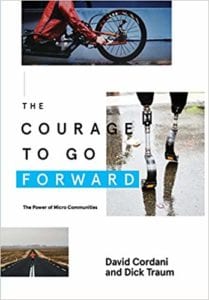
The Courage to Go Forward: The Power of Micro Communities
We did a lot of research. It’s coming back in terms of the research for runners. We have 11,000 children in our program called Achilles Kids. There are about 350 schools, 145 in New York and a large part of this group are people who are on the autism spectrum. We found that children on the spectrum who run, improve significantly a number of areas. Cigna helped us. They financed a research project. We took 95 children in five schools who were on the autism spectrum. We found that if they run which they were doing, they improved physically, which is a no-brainer but they also improved cognitively and socially.
Does it get greater improvement the more you run?
Probably, yes. We have a very fine study that says if you’re on the spectrum and you run, you will improve. I have seen it. We have kids who have been out there for a number of years. To me the greatest delight is when they come out, they are happy. The beauty of it is that a child who is on the spectrum, who runs and is in shape is faster than the peer who is not on the spectrum.
Do you do anything other than running? I was thinking because one of the ways I met Erik, the man I said hiked to the top of Mount Everest, he was blind. I saw him blind rock climbing once here in Arizona. There are other events that are related to physical activities. Why running?
The beauty of running is number one, this is most important for me is it’s mainstreaming. In other words, when people go out and they run, not only are they doing well for themselves, but they’re also doing well for people with disabilities because others see them. You realize because you are disabled doesn’t mean that you’re physically unfit or that you can’t do things. The most important aspect of our program is mainstreaming. Now, we do have other projects that we’re involved with. For example, we have a very large triathlon team. It’s large enough that whenever our group participates in their triathlon, we typically have the largest team than anybody out there.
That’s good because if somebody is good at one of the three.
What’s also interesting is that the person who leads our triathlon program is visually impaired. He’s in-charge of it and this is very important that we have people in leadership positions with disabilities. It’s not like someone taking care of the chickens in a chicken coop. This is a person who is blind, but he can lead the way.
My father rode in college and being blind, that was a good sport for that. If he were alive today, he would find these opportunities for sports and running and things that a lot of them he couldn’t do very appealing. That’s what you’re doing. It’s great for so many people who sometimes think that maybe they can’t do things but they can. It’s an interesting book with insightful and inspiring stories. A lot of people would like to know about The Courage to Go Forward is the name of the book. You share some interesting people’s experiences and things in it. If people are interested and they want to get your book or find out more about Achilles, can you share some links or ways to find out more?
A good way to do it is you get on Amazon or Barnes & Noble and purchase it. Another way is to look at our website which is Achilles International and the information on how to purchase a copy.
Is there another site? CourageToGoForward.com?
There is. Thank you for that.
[bctt tweet=”Being disabled doesn’t make you physically unfit.” via=”no”]I want to make sure we give everybody every opportunity because it’s a great book. It’s been so nice to have you on the show, Dick. I wish you and David Cordani a lot of success with the book. I wish you great success with Achilles International.
Thank you very much. Maybe at some point being that you’re a runner, you can join us.
That would be great. I would love that.
—
I want to thank both Bill and Dick for being on my show. We get so many great guests on the show. I know we talked a lot about the work I’m doing with Curiosity and the new book Cracking The Curiosity Code as well as the new assessment, the Curiosity Code Index can both be found at CuriosityCode.com. We’re doing some amazing work to try and work on some of those things that are inhibiting curiosity or impacting them in the workplace. Those include fear, assumptions, technology and environment. There is a lot of information to be found in the book. You can also take the assessment and we’re also training HR professionals, consultants and people who want to become certified to give the CCI. I appreciated having my guests on the show. It was so interesting. I hope you come back and join us for the next episode of Take the Lead Radio.
Important Links:
- Mastery of Life
- Bill Ferguson
- Get Your Power Back
- MasteryOfLife.com
- Articles & More
- Achilles International
- The Courage to Go Forward, The Power of Micro Communities
- David Cordani
- Tanner Gers – previous episode
- Erik Weihenmayer – previous episode
- Zoe Koplowitz
- CourageToGoForward.com
- CuriosityCode.com
About Bill Ferguson
Bill Ferguson’s approach to life has been called the “penicillin of psychology.” As a former divorce attorney, 15% of his clients never divorced and the ones who did were able to part as friends. Media across the country affectionately call him “The Love Counselor.” He has been featured on Oprah and recommended by The Wall Street Journal. His book, How to Heal a Painful Relationship, has become a national best-seller. His newest book, Get Your Power Back, shows how to find and heal the inner issues that destroy love and sabotage our lives. Bill shows step-by-step how to resolve problem areas, heal relationships, and create a great life. He trains therapists, leads seminars, and works with people around the world.
About Dick Traum


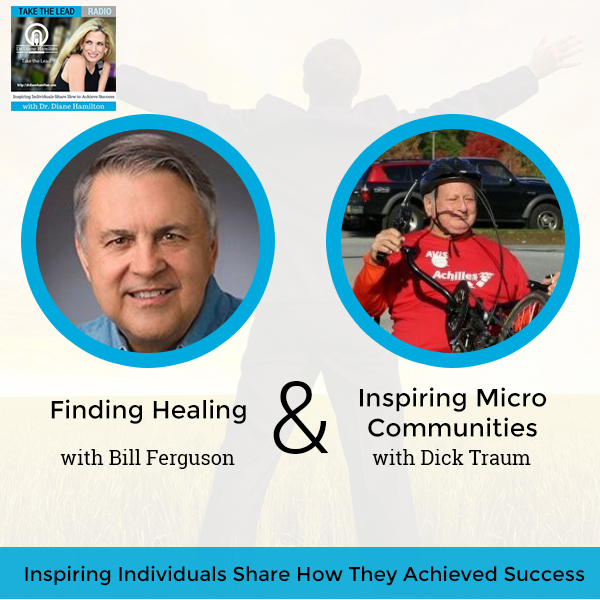
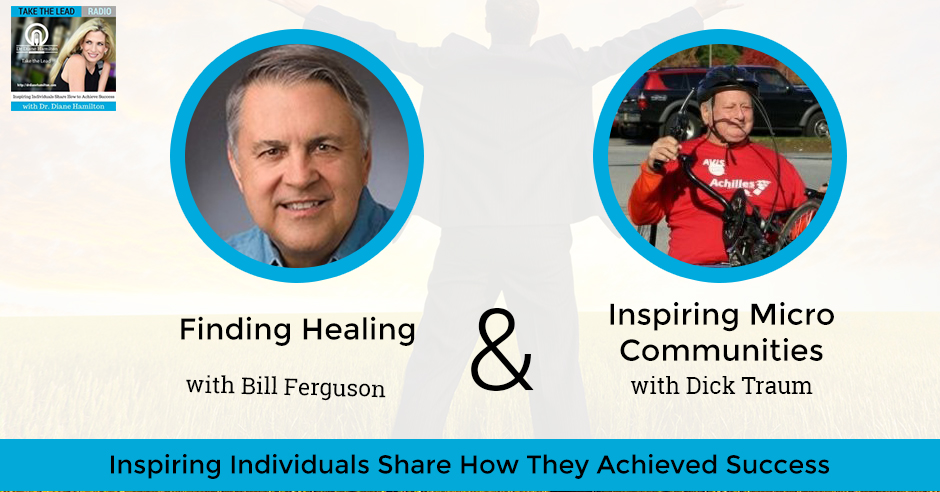
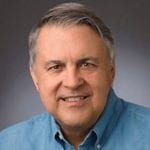

0 Comments